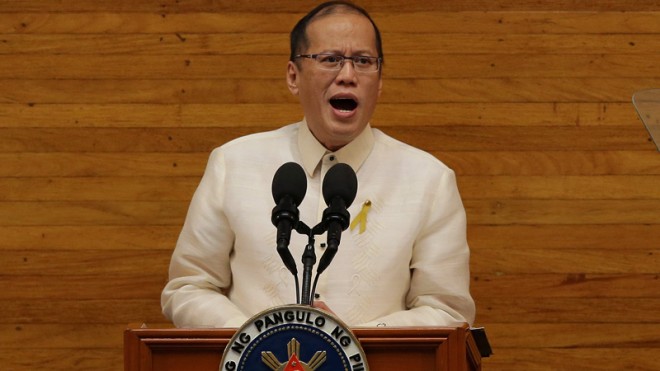
Philippine President Benigno Aquino III delivers his 5th State of the Nation Address during the joint session of the 16th Congress at the House of Representatives in suburban Quezon city, north of Manila, Philippines Monday, July 28, 2014. AP
MANILA, Philippines—“You wanted a statesman, he showed you how to be a statesman.”
Cabinet Secretary Jose Rene Almendras on Monday made this statement to explain why President Aquino veered away from making direct attacks against the past administration, his critics and his pet peeves in the Cabinet as he used to do in his first four State Of the Nation Addresses (Sonas).
Akbayan Rep. Walden Bello said he knew something was amiss when the President started off his speech on a somber note.
“Since 10 minutes into the speech, I realized that he was going to adopt an above the fray speech, and mentioning the three senators would have been a discordant note,” Bello said.
The President was widely expected to cite the arrests of Senators Juan Ponce Enrile, Jinggoy Estrada and Bong Revilla as a sort of trophy in his “daang matuwid” campaign, which prompted more senior politicians like Speaker Feliciano Belmonte Jr. to caution him against “gloating” in his speech.
That he glossed over the Department of Justice-National Bureau of Investigation’s efforts in the pork plunder cases was for many the biggest omission in his televised speech.
Almendras told the Inquirer that the President had no intention of “putting down” the three senators in his speech. “He is not the kind who hits other people when they are down. It could also be sub judice,” Almendras said.
In his previous Sonas, the President made former President Gloria Macapagal-Arroyo a target even if the Pampanga representative was already in hospital detention for plunder.
Back on present, future
“If you noticed, only 15 percent of his speech is about the past, the bulk of his speech is about the present and the future. The President only has 700 days in his term and his main priority is to map out his plans to meet his other goals,” Almendras said.
Navotas Rep. Tobias Tiangco said this was by far the best Sona of the President.
“He stuck to the issues by talking about the problems of the country and the daily problems of the people, what he has done and what he plans to do. He just tickled his critics, unlike before when he carried a punch. He is a human being; he also has a right to get hurt,” said Tiangco in a text message.
Former Quezon Rep. Danilo Suarez said he was “glad” the President had stopped slamming Arroyo and her administration in his Sona. “He hinted at issues in the past administration but he gave no specifics. This shows that, at the least, the President has moved on,” said Suarez
Belmonte said he was not surprised by the marked change in tone of the President’s Sona.
“His speech was a different tack altogether … and really won over everyone there and beyond,” said Belmonte.
Conciliatory
Bello said the President “really tried to reach out to his critics and was conciliatory in his approach.”
“What was particularly masterful was his use of DAP (Disbursement Acceleration Program) projects to illustrate his good governance points, ending with an appeal to Congress to pass a supplemental budget and a law delineating the fiscal powers of the different branches of government. He came across here as respectful of the separation of powers,” Bello said.
For Bello, the biggest “hole” in the President’s speech was the freedom of information (FOI) bill.
“That was disappointing. On the other hand, he did mention land reform, though he could have been stronger on this,” Bello said.
The President had been expected to push for the FOI bill in his penultimate Sona.
“I was hoping that his speech would carry the FOI, but I didn’t expect it to be mentioned,” Sen. Grace Poe, main proponent of the FOI bill, told reporters. “While it wasn’t promptly addressed, I have no doubt of the personality of the President. As he said, he would carry on the reforms he has begun.”
When asked if she remained hopeful about the approval of the FOI, she said: “We were able to pass the FOI in the Senate without any certification. It’s not a hindrance.”
The Senate passed its version, Senate Bill No. 1733, in March.
Malacañang had balked at the President certifying the bill as urgent, deferring to the public to pressure House representatives to follow the senators’ lead in approving it.
Belmonte vowed the passage of the House version during his term, which ends in 2016.
The Senate took less than a year to pass the measure in the first regular session of the 16th Congress. The House has between now and June 2016 to do this.
Failed enforced disappearances
Yet again, the President failed to touch on the issue of enforced disappearances and extralegal killings.
Concepcion Empeño, mother of missing University of the Philippines student Karen Empeño, was among 28 personalities who filed an impeachment complaint against Aquino over the voided DAP.
During US President Barack Obama’s visit to Manila in late April, Aquino was confronted about the killings of journalists.
More than 50 journalist murders that took place from 2004 to 2013 remain unsolved, the Committe to Protect Journalists said in May.
Bello also said the President was able to “disarm his critics, at least temporarily.”
“The big losers were members of the extreme left who simply could not find an antidote to the President’s rhetorical skills and his sincerity. What was particularly pitiful was that hardly anyone noticed the walkout. What a wasted gesture! I did not realize they could be so amateurish. I could have given them good advice on how to do an effective walkout had they consulted me,” Bello said.
RELATED VIDEO

